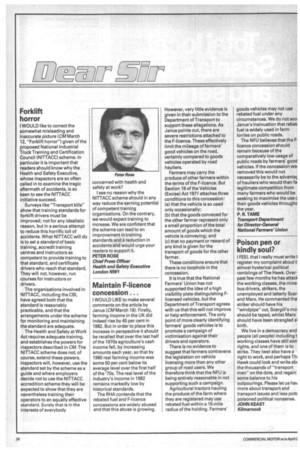Maintain F-licence concession . . .
Page 28

If you've noticed an error in this article please click here to report it so we can fix it.
I WOULD LIKE to make several comments on the article by Janus (CM March 19). Firstly, farming income in the UK did indeed rise by 45 per cent in 1982. But in order to place this increase in perspective it should be recalled that over the last half of the 1970s agriculture's cash income fell, by increasing amounts each year, so that by 1980 real farming income was some 50 per cent below its average level over the first half of the '70s. The real level of the industry's income in 1982 remains markedly low by historical standards.
The RHA contends that the rebated fuel and F-licence concessions are widely abused and that this abuse is growing. However, very little evidence is given in their submission to the Department of Transport to support these allegations. As Janus points out, there are severe restrictions attached to the F-licence. These effectively limit the mileage of farmers' good vehicles on the road, certainly compared to goods vehicles operated by road hauliers.
Farmers may carry the produce of other farmers within the terms of the F-licence. But Section 18 of the Vehicles (Excise) Act 1971 attaches three conditions to this concession: (a) that the vehicle is so used only occasionally; (b) that the goods conveyed for the other farmer represent only a small proportion of the total amount of goods which the vehicle is conveying; and (c) that no payment or reward of any kind is given for the transport of goods for the other farmer.
These conditions ensure that there is no loophole in the concession.
It is true that the National Farmers' Union has not supported the idea of a high visibility plate distinguishing Flicensed vehicles, but the Department of Transport agrees with us that this will not improve or help enforcement. The only point of more clearly identifying farmers' goods vehicles is to promote a campaign of victimisation against their drivers and operators.
There is no evidence to suggest that farmers contravene the legislation on vehicle licensing more than any other group of road users. We therefore think that the NFU is being entirely reasonable in not supporting such a campaign.
Agricultural tractors hauling the produce of the farm where they are registered may use rebated fuel within a 15-mile radius of the holding. Farmers' goods vehicles may not use rebated fuel under any circumstances. We do not acci Janus's insinuation that rebati fuel is widely used in farm lorries on public roads.
The NFU believes that the F. licence concession should remain because of the comparatively low usage of public roads by farmers' good vehicles. If the concession wa: removed this would not necessarily be to the advantac of hauliers who would then fa legitimate competition from many farmers who would be seeking to maximise the use c their goods vehicles througho the year.
P. R. TAME Transport Department for Director-General National Farmers' Union








































































































